Ali: | Can you tell us a little about your childhood in Arkansas? Were you a reader from an early age?
|
Ed: | I grew up in a fairly small town. Because it was in the hill country, TV reception was poor. For entertainment, kids my age had radio, comic books and, most important, movies on the weekends, both at the double-feature theater downtown and out at the drive-in. I found myself reading from around age 9 - at first juvenile fiction given to me by relatives. In my teens I discovered adult fiction, especially the lurid kind, and was on my way to reading everything I could get my hands on. Historical novels, westerns, Mickey Spillane, science fiction, you name it.
|
Ali: | What were the early books you read that either influenced you or made you take up the pen?
|
Ed: | I remember the excitement of discovering Zane Grey when an aunt gave me a copy of Spirit of the Border for Christmas. Around the same time, I also got Huckleberry Finn as a gift. Grey feels overblown and melodramatic today, but his romantic take on the American West inspired me to read more. Twain's wild humor, in a story seen through a boy's eyes, had the same effect. I could sense that there were a lot of books out there waiting to be read.
|
Ali: | Were your parents readers?
|
Ed: | My father didn't read much, but my mother read endlessly. A lot of it was popular fiction of the day, but as she got older, her interests expanded to include writers such as William James and topics such as mysticism.
|
Ali: | Have you been a follower/reader of the crime/mystery/thriller genre?
|
Ed: | Yes, but not in a methodical way. I dip into it regularly but don't pretend to be widely read. I have my favorites, and every now and then I discover someone new. I do lean a little more toward the classic writers, I think, especially the noir boys. I just finished reading my way through a lot of James M. Cain and am now reading Chandler's The Little Sister, which I'd somehow missed.
|
Ali: | Tell us a little about your education at Vanderbilt University and Northwestern University.
|
Ed: |  I took a bachelor's degree with honors in English literature at Vanderbilt. Vanderbilt is in Nashville, Tennessee, and has a very southern flavor, which I appreciated. It also has a tradition of writers - Robert Penn Warren, among many others - and played host to the writers and critics who made up the Fugitive Movement of the 1930s and 1940s. Having Warren inscribe a copy of All the King's Men to me gave me one of my best memories of Vanderbilt. I took a bachelor's degree with honors in English literature at Vanderbilt. Vanderbilt is in Nashville, Tennessee, and has a very southern flavor, which I appreciated. It also has a tradition of writers - Robert Penn Warren, among many others - and played host to the writers and critics who made up the Fugitive Movement of the 1930s and 1940s. Having Warren inscribe a copy of All the King's Men to me gave me one of my best memories of Vanderbilt.
Northwestern came after my Navy years, when I'd decided that I wanted to go into journalism. Northwestern has one of the best graduate journalism programs in the country. It's also in the Chicago area and thus gave me a whole new universe to live in (along with Chicago's notoriously terrible climate). I got a master's in journalism at N.U., and soon thereafter found myself working at the Chicago Tribune as a reporter.
|
Ali: | You mentioned the US Navy. Could you tell us a little about that time?
|
Ed: | For a kid out of college who hadn't a clue as to what to do with his life, the Navy came at a good time. After the unstructured quality of university life, the military demands that you finish growing up and get to work. It's good discipline. I went through officer's training and spent three years aboard a destroyer in a variety of jobs. Along with my shipmates, I witnessed the final series of atmospheric nuclear tests in the South Pacific before the test-ban treaty with the Soviets sent all testing underground. As a footnote, one of my commanding officers was Stansfield Turner, the now-retired admiral who served as head of the CIA under Jimmy Carter.
|
Ali: | You were a journalist with the Chicago Tribune and the Los Angeles Times. What did journalism bring to your life and your writing?
|
Ed: | Simply put, a familiarity with the language. Reporters and editors are in the business of moving words around and learning how to use suitable ones for the task at hand. It's less about literature than just good, clear communication. I'd recommend a period of newspaper work for anyone considering doing any kind of writing for a living. It's a good place to learn the tools in the toolbox.
|
Ali: | What were your early experiences as a writer working full time?
|
Ed: | 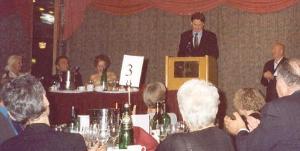 That began in 1993, when I left the L.A. Times after several years of editing there, mostly in foreign news. As a newborn freelance writer, I wrote a monthly column for the Times on international travel but spent most of my time trying to write a novel. The work was very slow and painful. Although journalism had gotten me on a friendly basis with words and sentences, it had done nothing to prepare me to write pure fiction - i.e. to make things up. I had to learn that on my own, learn to trust my imagination. For someone used to dealing with news and facts, that's a big leap. That began in 1993, when I left the L.A. Times after several years of editing there, mostly in foreign news. As a newborn freelance writer, I wrote a monthly column for the Times on international travel but spent most of my time trying to write a novel. The work was very slow and painful. Although journalism had gotten me on a friendly basis with words and sentences, it had done nothing to prepare me to write pure fiction - i.e. to make things up. I had to learn that on my own, learn to trust my imagination. For someone used to dealing with news and facts, that's a big leap.
I worked on a novel for about three years and was lucky enough to get an agent who liked it, but his efforts to sell it went nowhere. So I started another one. Unfortunately, my agent retired just then, which moved me back to square one - no agent, no publisher.
|
Ali: | Did you get support from family and friends?
|
Ed: | Yes, especially from my wife, Cathy. You'll notice that I dedicated Clea's Moon to her. She believed all along that I was going to get published some day.
|
Ali: | I was at Deansgate in 2001 when you won the CWA Debut Dagger, so could you tell me a little about how that came about?
|
Ed: | 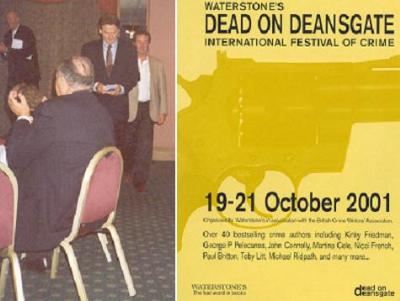 I'm glad you were there, because that was the beginning of it all for me. In the space of about a week, I went from being a guy with an unfinished manuscript to someone with a literary award, a new agent, and a publishing contract. The Debut Dagger opened all those doors, which is a testament to the power of the award and of the CWA. I think it was about then that I stopped using the term "ex-newspaperman" and started using "writer". I'm glad you were there, because that was the beginning of it all for me. In the space of about a week, I went from being a guy with an unfinished manuscript to someone with a literary award, a new agent, and a publishing contract. The Debut Dagger opened all those doors, which is a testament to the power of the award and of the CWA. I think it was about then that I stopped using the term "ex-newspaperman" and started using "writer".
|
Ali: | George Pelecanos was there as the guest of honour and he is also an Orion author. Did you have a beer with him?
|
Ed: | No - that would have been a great topper to an already wonderful evening. But I still remember George's kindness when he came over to my table to introduce himself and offer his congratulations. It was very gracious of him. Instead of a beer, my wife and I bought a bottle of champagne and retired to our room. I had no complaints.
|
Ali: | I discussed Clea’s Moon with Russell James and Mike Jecks of the CWA recently and we all agreed that your first chapter was remarkable in its freshness. How important is the first few paragraphs in a book?
|
Ed: | Pretty darned important. I need to remind myself of this again with each book, because that first setup is usually very hard to get right. But if you can get it, it's worth it. And I hear the same opinion from others too, especially book reviewers. I recall hearing one critic say that if the first two pages don't grab him, he puts the book aside and picks up another one.
|
Ali: | Had the story of Clea’s Moon been gestating in you for a while?
|
Ed: | I believe so. In fact, I think it had its roots in my first novel, the one that was never published.
|
Ali: | So how did Orion pick up Clea’s Moon? And what have been your experiences working with Orion?
|
Ed: | After the 2001 Dagger Awards were announced, I was lucky to sign with Jane Conway-Gordon as my agent. She sent the partial manuscript out to Orion, and a week later they offered a two-book deal. I think they're a wonderful publishing house, from publishing director Jane Wood to every editor, copy editor and publicity person I've worked with. "Professional" is the word for all of them.
|
Ali: | For the readers who are not familiar with your work, would you tell us a little about Clea’s Moon, as well as how and why you came to write it?
|
Ed: | 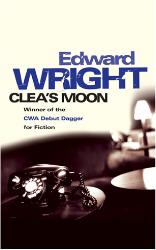 The book is about John Ray Horn's search for a missing teenage girl who was once his stepdaughter. In a larger sense, it's about his attempt to give his life some meaning by trying to put his fractured family back together. I think the idea for the setting first appeared in the unpublished novel I mentioned earlier. It was a contemporary mystery/thriller with many references to a notorious murder in 1940s Hollywood. When it came time to start another book - the one that eventually became Clea - I was reminded of all the research I'd done and the affection I'd developed for that time and place, and I found myself drawn back to it. I thought, why not set an entire story back then? The book is about John Ray Horn's search for a missing teenage girl who was once his stepdaughter. In a larger sense, it's about his attempt to give his life some meaning by trying to put his fractured family back together. I think the idea for the setting first appeared in the unpublished novel I mentioned earlier. It was a contemporary mystery/thriller with many references to a notorious murder in 1940s Hollywood. When it came time to start another book - the one that eventually became Clea - I was reminded of all the research I'd done and the affection I'd developed for that time and place, and I found myself drawn back to it. I thought, why not set an entire story back then?
|
Ali: | What attracted you to the 1940s Los Angeles backdrop?
|
Ed: | A couple of things. First, the city itself. In the late '40s, L.A. was beginning to move out of the shadow of New York and Chicago. It was big and sprawling but not yet aware of its own potential. I like to compare it to an adolescent who is stronger than he realizes. The catalyst, of course, was World War II, which had awakened this sleeping giant of a city and brought in tens of thousands of people for the war effort. At war's end, a lot of those people liked what they saw - the sunshine, the orange groves, the space and affordable housing - and decided to stay. So L.A. became a city growing at a great pace, unsure of what lay ahead.
I also have a special feel for films of the '40s, especially film noir. Many of them used L.A. as their backdrop, and in doing so they turned the sunshine-and-oranges image on its head, showing us the shadows under the palm trees. To me, those movies looked the way Raymond Chandler wrote. Without trying to re-create Chandler, I wanted to try to write down my own take on what I thought the city was like then.
|
Ali: | And your main character, John Ray Horn / Sierra Lane, is a most interesting protagonist. Can you tell us how you came upon him?
|
Ed: | It all happened fairly fast. Once I'd picked 1940s L.A. as the locale, I latched onto the notion of a character who had once been considered a hero of some kind but is no longer seen as heroic. It quickly seemed to me that a former cowboy movie actor would fit that description nicely. His heroism, of course, was only the movie kind, but I'm sure it seemed very real to the youngsters who once lined up to buy tickets to see him.
|
Ali: | Joseph Mad Crow is also an interesting character. Where did he spring up from?
|
Ed: | Mad Crow also showed up almost full-blown. I wanted Horn to be involved in menial work, a far cry from his old screen image. I thought: why not put him to work for the man who was once his faithful sidekick/servant? I liked the irony of that, also the irony of the former sidekick becoming a successful gambler.
|
Ali: | I take it that you are lover of Western ‘B’ movies then?
|
Ed: | I loved them when I first saw them. They were the purest expression of unabashed heroism I ever found as a youngster, and I think children, especially, boys, are hungry for that. But I can't watch them today. They're too simplistic and badly acted. They were for kids, and I'm afraid we can't go there again. (Obviously I'm not talking about the more complex westerns such as High Noon, Stagecoach, etc. Those are in another category altogether, and they'll have a long life.)
|
Ali: | Would I be right in thinking that you are also a Raymond Chandler fan?
|
Ed: | Absolutely. But I read Chandler more as a curiosity today. I think no one has ever equalled him in description, that laconic, hard-edged yet sometimes almost poetic way Marlowe had of expressing himself. He can still teach us things today. But I skim past the rest - the overheated dialogue, some of which was never meant to be spoken out loud; the huge plot holes, the strange coincidences, etc. Chandler is best read late at night, when you can let yourself drift back to those days and imagine encountering him for the first time in the pages of Black Mask magazine. Then, he must have been explosive.
|
Ali: | Your follow-up is called The Silver Face (Orion, £17.99 ) in the UK while in the US it is entitled While I Disappear (Putnam $25.95). How and why did the title alter for the US market?
|
Ed: | It was a publisher's decision. The Silver Face was the title I put on the original manuscript when I sent it out to both publishers. Orion liked it, but Putnam wanted to try something different.
|
Ali: | Were you under pressure to start a series with John Ray Horn / Sierra Lane and Joseph Mad Crow?
|
Ed: | My deals with Orion and Putnam were both for two books and specified that the second book would be a sequel to the first. I was happy to do so, since it gives me a chance to develop the characters.
|
Ali: | Can you tell us a little about The Silver Face?
|
Ed: | 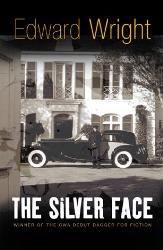 It's about a search into the past. John Ray re-encounters a onetime co-star from one of his very first westerns, a woman named Rose who's now marked by poverty and alcohol. Before he can determine what's happened to her, he finds her murdered in her shabby rooming house. His search for the killer leads him back into the 1920s, the era of the silent film and a lavish party at which a young girl's death changed several lives, Rose's among them. And since Rose was very important to him when her first knew her, the story is also about his paying off a debt. It's about a search into the past. John Ray re-encounters a onetime co-star from one of his very first westerns, a woman named Rose who's now marked by poverty and alcohol. Before he can determine what's happened to her, he finds her murdered in her shabby rooming house. His search for the killer leads him back into the 1920s, the era of the silent film and a lavish party at which a young girl's death changed several lives, Rose's among them. And since Rose was very important to him when her first knew her, the story is also about his paying off a debt.
|
Ali: | Do you feel that it is necessary to read Clea’s Moon before reading The Silver Face? Your follow-up is almost a stand-alone, in my opinion.
|
Ed: | I'm glad it feels like a stand-alone to you. I think you could jump right into The Silver Face. But if you plan to read both, it's probably best to read Clea first, since you'll learn a little more about John Ray's past than in the second book.
|
Ali: | Your work relies heavily on character to advance the plot. Are you a heavy plotter or do you tend to let the characters take you on the journey blindfolded?
|
Ed: | Plot is the hardest for me. I think character and setting are really most important, but I also think a mystery needs a strong plot to entice the reader to go along on the ride with you. I try to sketch out a good set-up - the first few chapters. Then I try to work out the resolution. When I begin writing, everything in between the two is a process of discovery for me.
|
Ali: | Do you have some nostalgia for the post WW2 era in which you place your work?
|
Ed: | I do. The clothes, the cars, the music. It's one reason I'm drawn to movies from that period. Even if they're not very good, I still enjoy seeing the period they depict.
|
Ali: | What differences do you see between the US and UK editors in terms of what they bring to the novel when you submit it?
|
Ed: | I think the best editors have a touch that could be described as firm but gentle. They have high standards and good story sense, but they let you write the book. They guide, they don't interfere. And you'll find good editors among Brits and Yanks both. I was pleasantly surprised to see that Orion didn't need to change any of my American spellings or expressions to the British equivalents. They accept my American-ness. If you compare the two editions side by side, you'll find very few noticeable differences. Most are small and subtle and reflect an individual editor's or copy editor's taste. I'm happy with the editing I got on both sides of the pond. The Silver Face and While I Disappear are virtually the same book.
|
Ali: | We spoke very briefly in a corridor at Bouchercon in Vegas last October and I hear that you’re in the UK at Crime Scene this summer. Can you tell us how much promotional work you have been involved in?
|
Ed: | I'm just now finishing most of the promotion for the U.S. edition. It's involved mainly bookstore visits in Southern and Central California. The only thing remaining in the States is a day long conference of mystery writers in Long Beach in September. Then there's Bouchercon in Toronto in October. When I get to England in early July for Crime Scene, Orion will have some promotional things lined up for me to do, I'm told.
|
Ali: | In today’s highly competitive world of publishing, what are your thoughts in how a new(-ish) author can establish him/herself on our crowded bookshelves?
|
Ed: | It's hard. There's a galaxy of established mystery writers out there, each with his/her own identity and following. 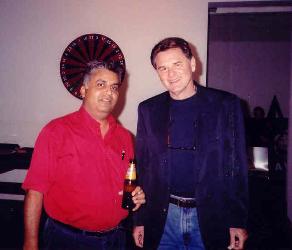 And when a new one comes along, it's difficult to stand out in the herd. For starters, I'd say try to find something fresh to give your readers. This could mean your character, your setting, or your worldview. And make sure it's a story you want to tell, not just one you think will sell, because your passion for the book will help push it along. Look at Alexander McCall Smith and his wonderful stories set in Botswana. When they first came along, did they look like bestseller material? They're not even mysteries, really, but they appeal to all kinds of people - including mystery readers - because of their take on human nature. And when a new one comes along, it's difficult to stand out in the herd. For starters, I'd say try to find something fresh to give your readers. This could mean your character, your setting, or your worldview. And make sure it's a story you want to tell, not just one you think will sell, because your passion for the book will help push it along. Look at Alexander McCall Smith and his wonderful stories set in Botswana. When they first came along, did they look like bestseller material? They're not even mysteries, really, but they appeal to all kinds of people - including mystery readers - because of their take on human nature.
And just keep working. Listen to friends and critics both, because they can all have something useful to say. With two novels out, I don't know if I'd call myself established yet. I guess all I can do is keep publishing and hope to pick up momentum as I go along.
|
Ali: | Would you have any advice for new writers in how to get their work into print? Especially people entering the CWA’s Debut Dagger?
|
Ed: | As all beginning writers quickly learn, it's hard to get an agent and even harder to land a publishing contract. Hard work is an important ingredient, but luck and timing are part of it too. The Debut Dagger competition provides a possible shortcut to those writers who lack both agent and publisher and may not even have finished their book. There's nothing quite like it in the States. To anyone who's working on a mystery and looking to get published, the best advice I can give is for them to enter the Debut Dagger contest.
|
Ali: | Are you a member of The CWA?
|
Ed: | No, mostly because I don't have the pleasure of visiting the U.K. very often. This trip, to attend Crime Scene, is my first in three years.
|
Ali: | What do you think of the current state of the crime/mystery/thriller genre?
|
Ed: | I'm probably the wrong person to ask, since I don't read broadly enough. I think there are wonderful writers out there - James Lee Burke, Dennis Lehane, Olen Steinhauer, Michael Dibdin - but that's based on my limited reading. My sense, though, is that it's a pretty vital time to be a mystery writer, with a lot of new blood coming along and the envelope being expanded in various ways.
|
Ali: | What books impressed you in 2003/4? And why?
|
Ed: | Two stand out: Dennis Lehane's Mystic River which to me had the weight of Greek tragedy; and Erik Larson's The Devil in the White City, a non-fiction account of the gigantic 1893 World's Fair in Chicago and the serial killer who operated on its fringes. It's history that reads like a novel.
|
Ali: | What do you see as future trends in the crime/mystery/thriller genre?
|
Ed: | If I had to guess, I'd say we'll see continuing emphasis on niche themes - quirky detectives with unusual personalities, jobs, settings, etc. And we might see the definition of the genre expanded to include more literary works. Wherever there's a gap to be filled, I'd bet there's a writer coming along to fill it. I just hope there'll continue to be an emphasis on character. I'll follow a good character anywhere.
|
Ali: | What are you working on currently?
|
Ed: | The third book in the John Ray Horn series, which will deal with the Red Scare of the late '40s.
|
Ali: | Thank you for your time and good luck with The Silver Face.
|
Ed: | My pleasure. |


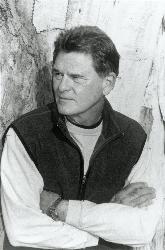 It was a big night for Ed, and one that would change his life. He had entered the competition after seeing it advertised while on holiday in Ireland. He flew over from California to receive his prize at the Dead on Deansgate Gala Dinner. Subsequently he signed a deal with Orion (in the UK) and Clea's Moon was published on February 20, 2003. The U.S. publisher was Putnam, where it was published on 24 April 2003. This showed that the CWA are a truly international organisation.
It was a big night for Ed, and one that would change his life. He had entered the competition after seeing it advertised while on holiday in Ireland. He flew over from California to receive his prize at the Dead on Deansgate Gala Dinner. Subsequently he signed a deal with Orion (in the UK) and Clea's Moon was published on February 20, 2003. The U.S. publisher was Putnam, where it was published on 24 April 2003. This showed that the CWA are a truly international organisation.
